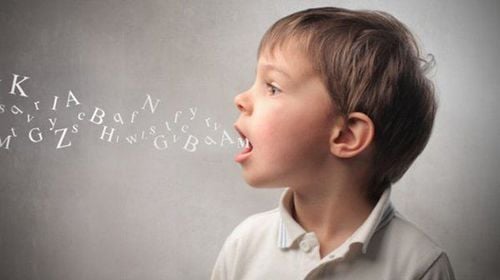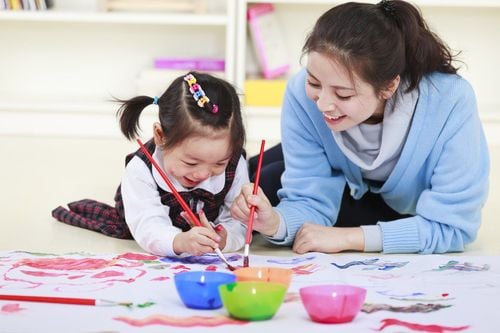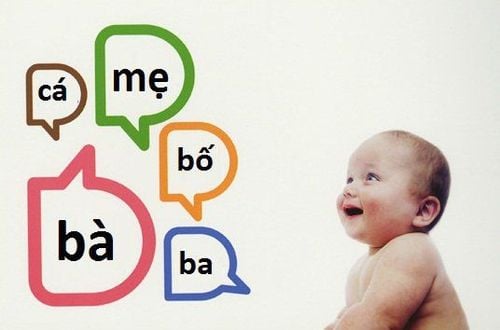This is an automatically translated article.
The article was professionally consulted by Resident Doctor Ho Thi Hong Tho - Neonatologist - Pediatrics - Neonatology Department - Vinmec Phu Quoc International General HospitalThe first voice of a child's life is a boundless happiness as well as a special concern of all parents. However, many parents feel confused by this issue. In fact, besides children who can speak early, there are also children who are slow to speak and do not speak properly. Therefore, parents need to understand the child's speech development at each age so that they can intervene in time in case the baby's speaking skills have problems.
1. When children start talking
Babies learn to talk in the first two years of life. Long before he utters his first word, he learns the rules of language and how adults use it to communicate.Baby will start by using the tongue, lips, roof of the mouth and any newly emerging teeth to make sounds (first squeaks, then "um" and "a" in a month or two) first and babble shortly after). Soon those sounds will become real words - "mama" and "baba" can drift out and a baby's speech may be as early as 6 months.
From there, the baby will absorb more words from you and everyone around. And sometime between 18 months and 2 years old, children will begin to form sentences of two to four words. As your baby progresses mentally, emotionally, and behaviorally, she'll increasingly be able to use words to describe what she sees, hears, feels, thinks, and wants.

Bé sẽ bắt đầu bằng cách sử dụng lưỡi, môi, vòm miệng và bất kỳ chiếc răng mới mọc nào để tạo ra âm thanh
2. How children learn to speak
Here's how you can expect your baby's talking to progress. If your baby is raised in a bilingual environment, language milestones often occur in both languages at the same time.2.1. In utero Many researchers believe that the work on understanding language begins while the baby is still in the womb. Just as your baby gets used to the steady beat of your heart, he will hear your voice and be able to distinguish you from others.
2.2. Newborn to 3 months Crying is your baby's first form of communication. And one cry doesn't fit all: A piercing scream could mean your baby is hungry, while a painful, whimper might signal that a baby needs a diaper change. As your baby gets older, your baby will develop a number of actions such as gurgles, sighs, and groans.
As for her ability to understand her own language, she begins to realize what words look like and what sentence structures are like when she listens to the people around her.
2.3. Your baby is 4 to 6 months At this stage, your baby is beginning to babble, combining consonants and vowels (such as "baba" or "mama"). Around 6 months, babies can respond when their name is called.
Your baby's attempts to talk will be like stream of consciousness monologues in another language with countless words connected together. Vocalization is a game for babies who are experimenting with using their tongue, teeth, palate and vocal cords to make all sorts of funny noises.
At this stage, the babbling sounds the same, whether you speak English, French or Japanese or Vietnamese. You may notice your baby likes certain sounds (like "ka" or "da"), repeating them over and over because he likes the way they make sounds and the feel of his mouth when you speak.
2.4. Baby is 7 to 12 months When your baby babbles and talks now, he sounds as if his words make a lot of sense. That's because the baby is trying out the same pattern tones as the ones you use. Nurture and develop babblers' speaking skills by talking and reading to them.

Nuôi dưỡng và phát triển kỹ năng nói của trẻ bập bẹ bằng cách nói chuyện và đọc cho trẻ nghe
2.6. Baby is 19 to 24 months Even though your baby may say less than 50 words, she now understands more than she can say. And baby picks up more words every day, so keep an eye on your language! Your baby can even string two words together, forming basic sentences like "Carry me".
By 2 years old, your baby can use sentences of two to four words and sing simple rhymes. As her sense of self matures, she will begin to talk about her likes and dislikes, what she thinks and feels. Pronouns can confuse your baby, which is why he might say "Baby throws" instead of "I throw."
2.7. Your baby is 25 to 36 months old Babies may have a hard time finding the right volume to use when talking, but they'll soon learn. Your baby is also starting to get used to pronouns, such as "I" and "you".
Between 2 and 3 years old, your baby's vocabulary continues to expand and he understands most of what you say to him. Your child will string nouns and verbs together to make simple sentences, such as "I'm leaving."
By the time your baby is 3 years old, she can be a pretty sophisticated talker. Your baby will be able to carry on a long conversation and you will be able to understand most of what he has to say. Your baby will even be compulsive when you ask her to do many things at once. ("Get the book and put it on the bookshelf.")
2.8. Baby is 3 to 4 years old At this time, favorite words usually include "why", "what" and "who".
2.9. Your child is 4 to 5 years old Communicates easily and can retell a simple story with a beginning, middle and end while looking at pictures. Can use four to five sentences to describe a picture, with most grammar elements in place. Use more than one action word in a sentence.

Ở thời điểm 5 tuổi, trẻ giao tiếp dễ dàng và có thể kể lại một câu chuyện đơn giản với phần mở đầu, phần giữa và phần cuối trong khi nhìn vào tranh
2.10. 6 to 7 year olds Can describe how two items are the same or different, retell a story or event without the aid of pictures, and retell conversations and events in the past past. Use some irregular plural nouns.
2.11. 8 years old Has mastered all voice sounds as well as the speed, pitch and volume of speech. Use complex and compound sentences correctly and have the ability to carry on conversations with adults.
3. How to help your baby develop speaking skills
You can help your child with language skills by providing a rich and nurturing communication environment. The most important things to do:Talk. You don't have to talk much with your baby, but talk to him whenever you're with him. Describe what you are doing, point things out, ask questions and sing songs. (Although it's fine to use simple, clear speech, limit whispering and babbling. Babies learn to speak well by hearing you speak well.) Read. Reading to your child is a great way to expose them to new vocabulary, how sentences are put together, and how stories flow. As a child, he will enjoy the sound of your voice, as a toddler he will love stories and pictures, and as a preschooler he can even jump in to tell you what's going on in a book. To listen. When your baby talks to you, be a good listener - look at your baby and respond. Your baby is more likely to speak up when she knows you're interested in what she's saying.

Đọc cho con bạn nghe là một cách tuyệt vời để trẻ tiếp xúc với từ vựng mới
4. What to do if the baby won't talk?
You are the best person to assess your baby's speech development. If your child has any of the signs listed below and you are concerned, you may want to discuss the possibility of a language delay or hearing problem with your pediatrician.Your doctor may refer your child to a pediatric speech-language pathologist for evaluation. Alternatively, your doctor's office, child care provider, or local school can direct you to an early intervention program in your area - usually coordinated through the public school system or county - offers free screening for language problems. Some signs to watch out for:
4.1. Baby is 6 to 12 months Baby doesn't make (or even tries to make) any sounds or makes eye contact with you, doesn't make vowels ("ah," "eh," "oh "), doesn't respond to baby's name or sounds around him at 6 months, doesn't babble by 9 months, or doesn't say single words (including "mama" or "baba") by 12 months.
4.2. Your baby is 13 to 18 months Your baby doesn't just point things out to you, doesn't pick up new words, doesn't have at least six words by 18 months, or loses the language skills he used to have.
4.3. Your baby is 19 to 24 months old By 24 months, your baby is not pointing at parts of his body, cannot follow simple instructions, cannot copy words and actions, or uses only single words .
4.4. Your baby is 25 to 36 months old At 36 months, your baby has not yet begun to use two or three word phrases, does not follow simple instructions, speaks incoherently or is difficult to understand.
If your baby stutters, it doesn't necessarily signal a problem. Stuttering is a normal stage, especially when your baby's communication skills are developing rapidly. Sometimes, your baby will be so excited to tell you what he's thinking that he won't be able to say it fast enough.

Nếu tình trạng nói lắp của trẻ vẫn tiếp tục xảy ra sau 4 tuổi, hoặc nếu tình trạng nói lắp của trẻ quá tệ đến mức căng cứng hàm hoặc nhăn mặt để cố gắng nói ra, hãy nói chuyện với bác sĩ về điều đó
When a child shows abnormal signs of health, parents can take the child to Vinmec Health system for timely examination and treatment.
In order to prevent diseases that young children are susceptible to as well as for their physical and intellectual development, parents should pay attention to nutrition to improve children's resistance. At the same time, add supporting foods containing lysine, essential micro-minerals and vitamins such as zinc, chromium, selenium, B vitamins,... snacks and less digestive problems.
Parents can learn more:
Why do you need to supplement Lysine for your baby?
The role of zinc - Guidelines for reasonable zinc supplementation
Please visit the website Vinmec.com regularly and update useful information to take care of your baby and family.
Reference source: babycenter.com














